Newsletter


Our Newsletter
Connections
Sep
6
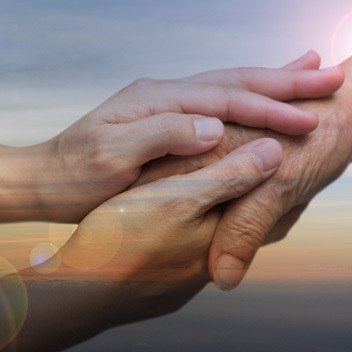
Understanding Skirball Hospice: A Q&A with Dr. Noah Marco
Among Los Angeles Jewish Health's many exceptional programs and services,
Skirball Hospice stands out. Our skilled, compassionate end-of-life care
provides patients and their families with critical support during one of life's
most challenging times. We are proud to be a nurturing, collaborative partner
in helping to meet their needs.
It can be confusing to understand the
difference between hospice care and palliative care. Below, Los Angeles Jewish
Health's chief medical officer, Noah Marco, MD, sheds light on what
distinguishes each and offers an introduction to what makes Los Angeles Jewish
Health the right choice for these services.
Question: What is hospice,
and when should someone consider it?
Answer: Hospice services should be
considered by an individual whose doctor believes his or her life expectancy may
be less than six months. The decision to enroll in hospice is usually made when
a life-limiting condition is believed to be advancing, when medical intervention
has reached its maximum benefit, and when a patient or their representative
decides to focus on maintaining comfort and symptom management at home rather
than in a hospital setting. Hospice is a federal benefit that provides
additional services not usually covered by other insurance plans.
Q:
What is the difference between hospice and palliative care?
A:
Palliative care helps optimize quality of life by anticipating (or preventing)
any form of pain and suffering rather than treating an underlying disease.
Qualifying individuals do not have to meet the strict criteria requirements of
hospice to receive this care. The focus of palliative treatment is both on
meeting the patients' physical needs with regard to symptom management and the
psychological, spiritual, and social challenges diseases create. Many
individuals start in palliative care until they meet the care criteria for
hospice. Palliative care can be provided in a hospital, cancer center, nursing
home, outpatient clinic, hospices, or in the patient's home.
Q: Where
does Skirball Hospice care take place?
A: Hospice services are offered
wherever the person is residing. Currently, 30% of Skirball Hospice patients are
residents of Los Angeles Jewish Health, and 70% are community residents in the
San Fernando Valley, West Los Angeles, and surrounding cities. The very first
visit can even occur in the hospital. One of the advantages of Skirball Hospice
is that our clinicians go to people's homes rather than requiring patients to
find transportation to a clinic or doctor's office.
Q: What
differentiates Skirball Hospice among other, similar hospice services?
A: Founded in 2002, Skirball Hospice is the only Jewish-sponsored nonprofit
hospice in the greater Los Angeles area. It has a well-deserved reputation for
high quality, caring service. Though our program has its roots in Jewish values,
we proudly serve people of all faiths and backgrounds. We work with a variety of
payors including Medicare, Medi-Cal, and most private insurances, and because we
are a not-for-profit agency, no one is ever denied service because of inability
to pay.
Q: What type of support does Skirball Hospice provide family
members, both during hospice and after the passing of a loved one?
A:
Whereas routine medical care can often focus on the individual patient,
providing little or no support to family and friends who may also be impacted by
the burdens of disease, the dedicated staff members at Skirball Hospice offer
families compassionate assistance from the very first contact. Our response team
is available to meet in the home or at a hospital or care facility. Our
bereavement staff is trained and experienced in the areas of counseling,
chaplaincy, spirituality, end-of-life, grief, and loss. Bereavement support at
Skirball Hospice includes ongoing planned contact with the family through
visits, telephone calls, letters, an annual memorial service, and referrals to
community resources such as support groups. All participants in the bereavement
program receive a comprehensive series of mailings on a monthly basis to help
reflect on their loss and assist with the grief and recovery process. Our
support continues for 13 months, covering an entire cycle of holidays,
birthdays, and anniversaries and helping family members maintain or regain their
level of well-being.
For more information, call Skirball Hospice at
(877) 774-3040.
Sep
6
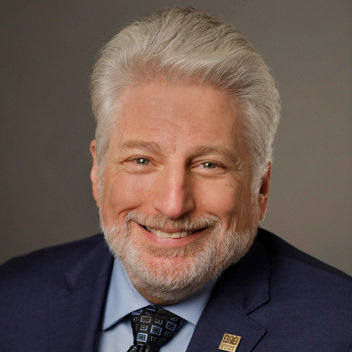
Noah Marco, MD, Tapped for Prestigious Spot on Statewide Healthcare Association Board
This summer, Los Angeles Jewish Health's own chief medical officer, Noah
Marco, MD, was appointed to the board of directors of the California Association
of Long-Term Care Medicine (CALTCM)—a highly visible organization on the
statewide healthcare landscape. During his two-year term, Dr. Marco will join
other CALTCM board members to help ensure the quality of skilled nursing
facility care in California.
Founded in 1975 as the California
Association of Medical Directors, CALTCM is the professional organization for
California physicians, nurses, pharmacists, administrators, and others working
in long-term care. The group is at the forefront of statewide efforts to
advocate for quality patient healthcare, provide long-term care education, and
influence policy.
"I am thrilled to be serving on the CALTCM board and
feel gratified to have this opportunity to give back to the community," Dr.
Marco says. "It's also a privilege to be able to raise the profile of Los
Angeles Jewish Health even further through my service by shining a light on
LAJH's innovative efforts to make a difference in the lives of older adults and
their families."
Aug
2
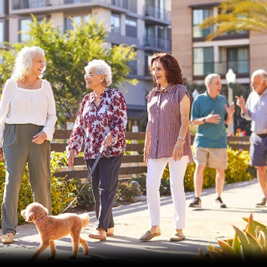
Los Angeles Jewish Health's Fountainview at Eisenberg Village Welcomes New Residents at Discounted Rates
In a world of rising prices and spiking inflation, it has become increasingly
hard to find exceptional value. Yet, that is precisely what is currently offered
for prospective residents at Los Angeles Jewish Health's
Fountainview at Eisenberg
Village independent living community. For a limited time, the facility's entrance
and monthly fees are the lowest in the greater metropolitan Los Angeles area.
Soon to be honored with the Los Angeles Daily News' popular Readers'
Choice award for "Best Retirement Community," Fountainview at Eisenberg
Village has made a conscious choice to hold down costs for older adults considering
a move. "We have a remarkable community that provides incredible all-inclusive
care, and we want to advance our mission of making that care available to a broader
group of people," says Larissa Stepanians, Los Angeles Jewish Health's chief
operating officer. "Our goal is to help older adults across Los Angeles take
advantage of the full spectrum of our programs and services."
The scope of those programs and services is vast. "Fountainview at Eisenberg
Village is essentially like a cruise ship on land," notes Adam Peña, the community's
executive director. "From our fitness center and spa to our movie theater and
beauty salon, we have it all. And that's on top of the world-class healthcare that
is tailored to suit each resident's needs."
Fountainview at Eisenberg Village's on-campus clinic and skilled nursing facility
give residents critical peace of mind, knowing they can access those services seamlessly—as
necessary, and without having to leave the comfort of their home environment. "You
can see your general practitioner, consult a medical specialist, or get physical
therapy, all right here on site," Adam says. "As you age and may experience
a decline in function, we're here to give you comprehensive support." That
support includes clinical oversight by a highly skilled registered nurse who is
on call around the clock.
Many individuals and couples who move to Fountainview at Eisenberg Village come
for the robust and stimulating socialization. "We have so many activities here.
Imagine wonderful classes like yoga and tai chi, plus countless opportunities to
meet people and make new friends who are your same age and at your same level of
cognition," Larissa says. "Because it's all-inclusive, residents also
get things like delicious kosher meals, which can be delivered directly to their
apartments, as well as transportation when they want to go off campus. And we're
pet-friendly!"
For many residents, living at Fountainview at Eisenberg Village during COVID-19
has helped get them through the pandemic. "Whereas isolation and loneliness
have impacted so many older adults living alone over the past two and a half years,
our residents have actually thrived during the pandemic," Larissa says. "Whether
it was getting them early access to the vaccine or giving them the technology and
tools to communicate virtually with loved ones, we enabled residents to stay healthy
and connected."
Resident Joy Picus, a long-time Los Angeles Jewish Health fan who served for
16 years as a member of the Los Angeles City Council, found Fountainview at Eisenberg
Village to be a refuge during a time of global upheaval. "We're much safer
here because we don't have to go anywhere that could expose us, since all the amenities
we want are provided for us on campus!" she says.
With entrance fees from as low as $399,000, the time has never been better to
embrace all that Fountainview at Eisenberg Village has to offer. To learn more,
contact [email protected] or (818) 654-5531.
Aug
2
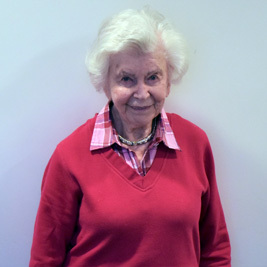
Los Angeles Jewish Health Residents Share Stories From the Shoah
Helene Kapel and her daughter Alicia Martin
With each passing year, the number of survivors of the Holocaust continues to
dwindle. At Los Angeles Jewish Health (LAJH), we are privileged to care for some
of these exceptional individuals, and we are dedicated to helping them preserve
their incredible stories of triumph and resilience.
This year, Los Angeles Jewish Health teamed up with the Providence Institute for Human Caring (a nonprofit
organization affiliated with Providence, one of the nation's largest health systems)
to document the histories of survivors who reside at Los Angeles Jewish Health.
In total, 11 residents ranging from 79 to 98 years-old shared their stories; the
interviews yielded both video and audio recordings.
"It was a humbling experience—and a true honor—to capture these
narratives," says Scott Acord, the Providence Institute's communications and
external affairs manager. "These folks and their families had their lives and
livelihoods stolen from them simply because they were Jewish. Yet, somehow, they
persevered. They possess an inner strength I'm not sure I'll ever have."
The interviews were conducted as part of Hear Me Now, an initiative founded by
the Providence Institute for the purpose of recording personal histories as a way
to make healthcare more humane. For many years, Hear Me Now partnered with StoryCorps,
a project that gained national prominence when it became a regular feature on National
Public Radio. As with StoryCorps, recordings from Hear Me Now are archived at the
Library of Congress.
Caroline Weingarten
"Sharing stories, and learning about those in our community, is one important
way of building a society that prioritizes personalized care," Scott says. "The
interviews with Holocaust survivors fall under our ‘faith-based and cultural traditions'
category. Providence is a Catholic-based organization, and it's important to us
to forge connections with members of other faith communities."
Those connections are what enabled the Los Angeles Jewish Health-Providence Institute
collaboration in the first place. Prior to assuming the role of CEO and president for Los Angeles Jewish Health,
Dale Surowitz had a long and successful career with Providence, most recently as
CEO of Providence Cedars-Sinai Tarzana Medical Center. Dale's relationship with
his peers at Providence was the initial impetus for the two nonprofits (Los Angeles Jewish Health and
the Providence Institute) to team up through Hear Me Now. Leading the
interviews were Los Angeles Jewish Health's own Annette Weinberg, lifestyle and
enrichment director, Katie Abelson, director of social services, and Susan Leitch,
safety officer and community manager. The interviews lasted between 15 and 60 minutes
each. Edited versions of the conversations will be available online at
hearmenowstories.org;
the full interviews will be accessible on the
StoryCorps website.
"We were blessed to record these stories and to be witness to these first-person
accounts of such a pivotal moment in history," Scott says. "Going forward,
they'll be a vital resource for future generations."
You may listen to Carolyn Weingarten's story "Fleeing to Palestine" by clicking here. Be sure to check back over the summer on the Los Angeles Jewish Health Website - lajhealth.org. We’ll be posting additional stories as they are shared with us.
Jul
5
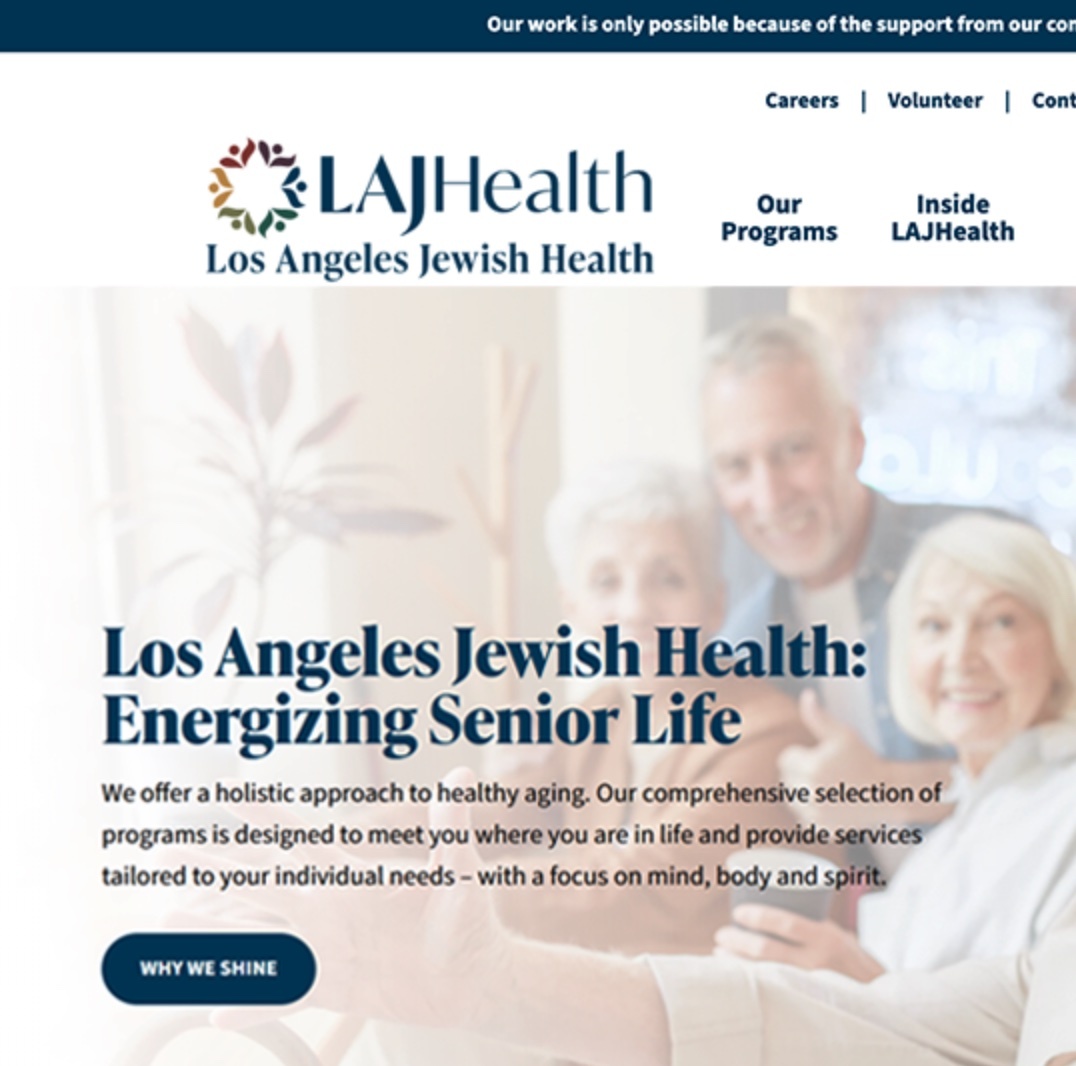
A New Name for the Los Angeles Jewish Home: Los Angeles Jewish Health
As it continues to build on more than a century of providing an array of high-quality residential living options and care for older adults in Southern California, the Los Angeles Jewish Home is unveiling a new name: Los Angeles Jewish Health (LAJH). The updated identity reflects our commitment to offering area older adults a full complement of exceptional programs and services and a comprehensive continuum of care – whether that care is at home, in the community, or on one of our beautiful campus settings.
With a new name and a continued focus on meeting diverse needs, Los Angeles Jewish Health meets older adults where they are in life, providing a customized experience.
“Over the years, as the needs of our community members have grown and changed, we have evolved, too, expanding the scope of healthcare services we provide. It is now the right time to transition to a name more reflective of the vast array of older adult care services and living options available through Los Angeles Jewish Health, while still remaining true to our mission and Jewish values,” says Dale Surowitz, CEO and President of Los Angeles Jewish Health.
The values piece is at the core of Los Angeles Jewish Health’s distinguished history of service, Dale notes, and nothing about that is changing.
“We are committed to our roots, and we’re the same organization we’ve always been, with rabbis on staff to help celebrate Jewish holidays, share Jewish teachings, and care for all those we serve with the same quality of care, respect, kindness, and compassion that has been the reputation of the Jewish Home for over a century,” he says. “But we also want to make sure people know that all are welcome here – that anyone can come and receive the kind of quality care, service, and attention we’ve always been known for.”
Shifting demographics mean Los Angeles Jewish Health is increasingly serving a more diverse population of older adults. By 2030, one in five Americans are projected to be older individuals. Older adults 85 and older are the fastest growing segment of this population and are expected to increase five-fold over the next 30 years, from four million in 2000 to 21 million in 2050. Los Angeles Jewish Health has kept pace with these trends: What began as a modest residential facility at the turn of the previous century has grown into a one of the nation’s leading health systems for older adults, providing for a rapidly expanding elder population with a broad range of geriatric and specialty healthcare needs.
“The Los Angeles Jewish Home name served us well for more than 100 years, but it doesn’t describe what we do now as an organization,” says Andrew Berman, chair of Los Angeles Jewish Health’s board of directors. “We are a healthcare organization for older adults, and although people do reside with us, we offer so many other services beyond what you would expect from just a ‘home.’ Our new name encompasses much more while also honoring and respecting the past and better describing who we are, what we do, and where we’re heading.”
Going forward, as we continue to reach new segments of the growing older adult population, the LA community will continue to benefit from the same remarkable, standard-setting care. “As we have for more than 100 years, we will dedicate ourselves to contributing Los Angeles Jewish Health’s extensive experience and medical expertise toward better health outcomes for all older adults,” Dale says. “At Los Angeles Jewish Health, that’s a promise!”
Jul
5
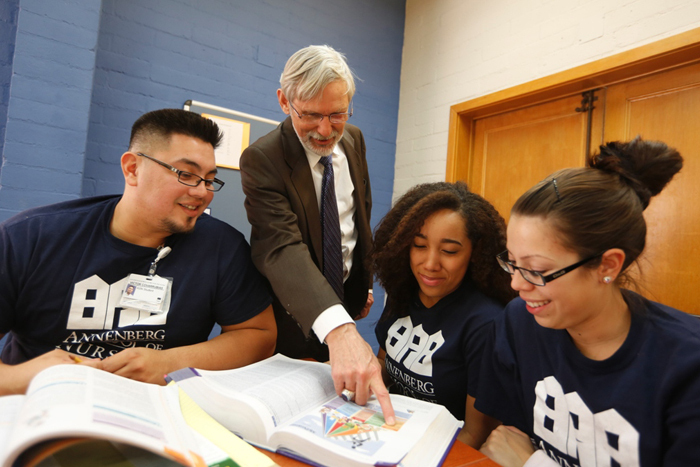
Los Angeles Jewish Health Earns Rave Reviews for Exceptional Programs and Services
Older adults and their families across Los Angeles turn to Los Angeles Jewish Health for compassionate, quality care. We provide critical programs and services that nurture their wellness and offer safe and attractive housing options – and they vote with their hearts, turning to us in increasing numbers to meet the full range of their living needs.
This summer, Angelenos have been voting for Los Angeles Jewish Health in several ways: In August, the Los Angeles Daily News will publish its popular Readers’ Choice awards, and Los Angeles Jewish Health will receive two important distinctions. The paper will recognize Los Angeles Jewish Health's Fountainview at Eisenberg Village as “Best Retirement Community” and the Annenberg School of Nursing as “Favorite Nursing School.”
“The accolades are recognition of the organization’s longstanding reputation for excellence,” says Los Angeles Jewish Health CEO and President Dale Surowitz.
“Los Angeles Jewish Health has been making a positive difference in our community for generations, whether it’s through our residential living, comprehensive care, or community programs,” he says. “We’re so grateful for these honors, which reflect the commitment of our incredible staff to raising the standard of care for older adults nationwide.”
Fountainview at Eisenberg Village, located in Reseda, along with Fountainview at Gonda Westside, nestled in Playa Vista, continue to redefine possibilities in independent living. As full-service Continuing Care Retirement Communities (CCRC), our Fountainview properties enable older adults to age in place knowing Los Angeles Jewish Health is available to meet all of their future healthcare needs.
The award for the Annenberg School of Nursing comes on the heels of another significant milestone: Last summer, practicalnursing.com ranked the school among the top three nursing schools in California. An aging population and the COVID-19 pandemic have sent demand for expert nursing care through the roof, and the Annenberg School of Nursing has proudly worked to meet this demand as they continue to graduate some of the state’s most talented nurses poised to improve health outcomes and transform patients’ lives.
Photo taken prior to COVID
“It’s always nice to be recognized for hard work and high achievement,” Dale says. “The bottom line is that at Los Angeles Jewish Health, we love what we do, and it shows.”
Jun
1
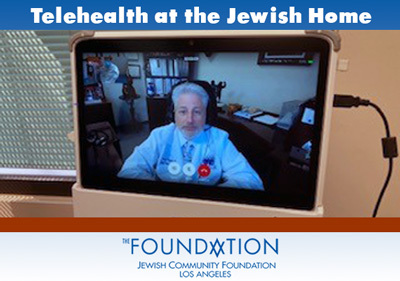
Los Angeles Jewish Home Receives Prestigious Grant for Telehealth Care
The Los Angeles Jewish Home is fortunate to partner with organizations across the city to provide care for the elderly men and women in our community. One of our frequent collaborators—and invaluable supporters—is The Jewish Community Foundation. This spring, the Home was the proud and grateful recipient of a generous Reimagine Grant from The Foundation, which provided funding to advance our innovative tele-health program.
Assistance from The Foundation helps cover the cost of key Jewish Home personnel responsible for rolling out state-of-the-art mobile telehealth carts that allow many of our residents to access high-quality care without leaving the comfort of a Jewish Home campus. Currently, the telehealth program is being piloted on the Grancell Village campus, and plans are to extend it across all Jewish Home facilities—making the future of senior care simpler, easier, and more comfortable than ever before.
Jun
1
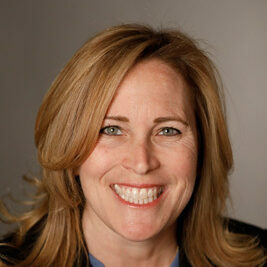
Celebrating Fifty Years of Women Rabbis
This June marks the 50th anniversary of the ordination of the first woman rabbi in the United States. Sally Priesand was ordained on June 3, 1972, on the Hebrew Union College-Jewish Institute of Religion (HUC-JIR) campus in Cincinnati, Ohio. Her professional milestone was a giant step forward for Jewish women, who have in the past half century distinguished themselves in a broad range of influential rabbinical roles.
Rabbi Karen Bender is one such pioneering influencer. In her role as chief mission officer of the Los Angeles Jewish Home, she is an invaluable source of wisdom, compassion, nurturing, and care for thousands of residents, who look to her for guidance and counsel. Her presence at the Home is deeply valued by residents, staff, and leadership alike.
"Rabbi Bender has the ability to touch people in a special way," says Jewish Home CEO-President Dale Surowitz. "You can see her gift reflected in the faces of our residents during Shabbat services—how she rekindles memories and helps them access heartfelt emotions. We're tremendously fortunate to have her here."
Dale is not alone is his admiration. "Rabbi Bender is an extraordinary human being and a truly amazing rabbi," says Andy Berman, chair of the Jewish Home's board of directors. "The fact that she grabs, and holds, the attention of a congregation whose average age is 91, is just incredible. She makes all of us so proud."
It's a sentiment widely shared around the Home. "Rabbi Bender has the ability to see the essence of every resident and connect deeply with them, and she lifts up their spirits with her presence, services, music, humor, and love," enthuses Ilana Springer, CEO/administrator of the Jewish Home's Joyce Eisenberg Keefer Medical Center.
In characteristically humble fashion, Rabbi Bender is less focused on her own accomplishments than on her gratitude for the path forged by Rabbi Priesand 50 years ago.
Hebrew Union College-Jewish Institute of Religion President Andrew Rehfeld, Ph.D., presents Rabbi Karen Bender with an Honorary Doctorate of Divinity
"We live in a patriarchal society, and not everyone likes to see women in leadership roles," she notes. "When women started being ordained, there was a lot of push back, and Rabbi Priesand took the brunt of it. What's remarkable to me is that she carries those memories so elegantly and chooses not to dwell on the negative, but instead to emphasize all the wonderful things she has done and experienced."
Perspective, Rabbi Bender says, is everything. "I've now been a rabbi for nearly 30 years. And, thinking back over my experiences, I could really tell the story in two different ways, and I suspect that would be the case for all women rabbis," she says. "We could share countless examples of the ways people tried to keep us down. Or we can tell it as a glorious, joyful story of aspiration, fulfillment, achievement, and creativity. That's definitely the lens through which I see things."
For Rabbi Bender, working at the Jewish Home provides a constant opportunity to reflect on the significance of being a woman rabbi. "I know what it means to the elderly Jewish women I have the pleasure of spending time with every day," she says. "I've had female residents tell me they wanted to be a rabbi, but that it wasn't allowed in their day. Seeing me in this position is beyond nachas—it's empowering. And how wonderful, at this stage of their lives, to be validated, not just as Jews, but as Jewish women."
Jun
1
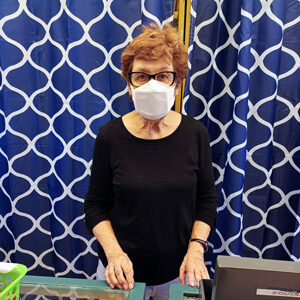
Why People From Many Generations Choose to Volunteer at the Los Angeles Jewish Home
There is no one single secret ingredient to the Los Angeles Jewish Home’s success. Our extraordinary staff, talented administrators, trailblazing board members, and generous donors all play a critical role in creating the kind of warm, nurturing, supportive environment that has earned the Jewish Home its stellar reputation nationwide.
However, one bit of Jewish Home magic deserves special attention: its incredibly dedicated cadre of volunteers, who tirelessly give of themselves—day in and day out—to improve the lives of the seniors we are so privileged to serve.
Aylene Kovary Gift Shop Volunteer, Eisenberg
At the Jewish Home, volunteering is central to our mission and to the smooth operation of our daily schedule. Volunteers hail from different places (some are loved ones of current or former Jewish Home residents; others are community members who have heard about our work and are excited to join in to help), but they share a common interest and intention, says Stacy Orbach, the Jewish Home’s director of volunteer services.
"No matter how they come to us, our volunteers are so grateful for the services we provide to seniors. They understand how much elderly men and women have done for our community, and they are eager to show their appreciation by giving back," she says.
Volunteers participate in the life of the Jewish Home in a myriad of ways, from reading to residents, to troubleshooting their technology issues, to assisting with special events. Many bring in their certified therapy dogs to visit with residents and enhance their emotional well-being. Others help lead our growing music therapy program, or simply play an instrument and bring it with them to the Home to share their skill with a deeply grateful audience. Another area of participation for volunteers is our intergenerational programming, which enables kids to spend time with our residents and delight them with their youthful vigor, as the younger generation learns so very much from the seniors.
Phil Moser, Book Cart/Book Distribution Volunteer
During the initial stages of the pandemic, we had to put a temporary pause on allowing volunteers onto Jewish Home campuses; securing the health of residents is always our top priority. Now, as the ongoing health safety protocols remain in place, we are ready to welcome volunteers back on campus. Volunteers must be vaccinated and have received at least one booster.
Even when COVID-19 necessitated isolation, there was another population of volunteers who did not have to vacate the Jewish Home premises: our residents themselves! Many of them spend a portion of their day volunteering in a broad range of capacities, from the mailroom to the arts and crafts studio, to our active Resident Councils.
Resident Robert Lehman is just one example. After arriving at the Jewish Home in 2011, he discovered that volunteering helped him put his own challenges in perspective.
"When I first got to the Home, I was focused on my own health issues, but then I realized there are so many people here in need of more assistance than I am," he recalls. "Volunteering helped me forget about my own troubles and concentrate instead on uplifting other residents as I worked to meet their various needs."
Robert’s volunteer efforts have included serving as President of one of the Jewish Home’s Resident Councils. In that capacity, he would meet each week with Jewish Home staff to address his fellow residents’ questions and concerns.
"The council was a vehicle for residents to express their needs and requests, and I am so grateful they confided in me and enabled me to serve them," Robert says. "I did my best to make everybody comfortable, and I worked hard to get people the ‘yes’s’ they were hoping for!"
Aylene Kovary helping a patron
Stacy points out that, whether they are residents or community members, volunteers make a crucial contribution at the Jewish Home. "Some of our residents can feel isolated from time to time, and volunteers help them feel they’re no longer alone," she says. "In addition to their able minds and bodies, our volunteers bring us unconditional love, which is the greatest gift we could possibly ask for."
To learn more about volunteer opportunities at the Jewish Home, contact Stacy Orbach at (818) 774-3219 or [email protected].